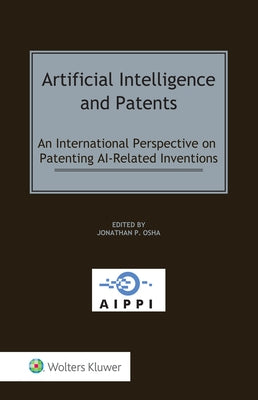Kluwer Law International
Artificial Intelligence and Patents: An International Perspective on Patenting AI-Related Inventions
Artificial Intelligence and Patents: An International Perspective on Patenting AI-Related Inventions
Couldn't load pickup availability
Artificial Intelligence ('AI') and the AI sub-field of Machine Learning ('ML') are terms that originated in the fields of computer and data science but now form part of the common vernacular. AI has now found application in virtually every field. Some applications of AI have become part of our daily lives: virtual assistants, chatbots, search engines, online language translation and eCommerce all employ AI in various forms. Generative AI such as OpenAI's products ChatGPT (natural language generation), Jukebox (music generation) and DALL-E2 (image generation) have captured the public attention to an enormous degree and can, indeed, do amazing things. A myriad of other applications of AI are found in disparate fields that, while not as visible on a daily basis, impact on our lives in a wide variety of ways.
With this rapidly-increasing impact comes not only exciting new technical capabilities but also new challenges for intellectual property ('IP') law. Are current laws fit for purpose or is something new or different needed? This is not a new question; one need only look back to the early days of digital music, computer software and 3-D printing to find similar discussions of whether existing IP law is suited to emerging technologies. For the most part, the answer in the past has been "yes", with perhaps a tweak here and there. Whether the same will be true of AI is, as yet, an open question. This book focuses specifically on AI and patents. Unsurprisingly, different jurisdictions have taken different approaches to patentability of AI-related inventions. Terminology (what is an "AI-related invention"?) also is inconsistent from one patent office to the next. These factors combine to create a maze of laws and regulations that patent applicants must navigate to secure protection for their innovations. To facilitate comparison of laws and practices, this book introduces a taxonomy that separates AI-related inventions into five conceptual categories. The patent law implications of each category are then addressed in national and regional chapters reflecting the perspectives of 16 major jurisdictions. All chapters follow the same structure, thereby allowing the reader to directly compare approaches taken by different jurisdictions. Thirty-nine subject matter experts from around the world contributed to this book. This is the eighth volume in the AIPPI Law Series which has been established together with the International Association for the Protection of Intellectual Property (AIPPI), a non-affiliated, non-profit organization dedicated to improving and promoting the protection of intellectual property at both national and international levels.Author: Jonathan P. Osha
Publisher: Kluwer Law International
Published: 09/18/2023
Pages: 368
Binding Type: Hardcover
Weight: 1.52lbs
Size: 9.21h x 6.14w x 0.81d
ISBN13: 9789403522159
ISBN10: 9403522151
BISAC Categories:
- Law | Medical Law & Legislation
- Law | Intellectual Property | Patent
Share

